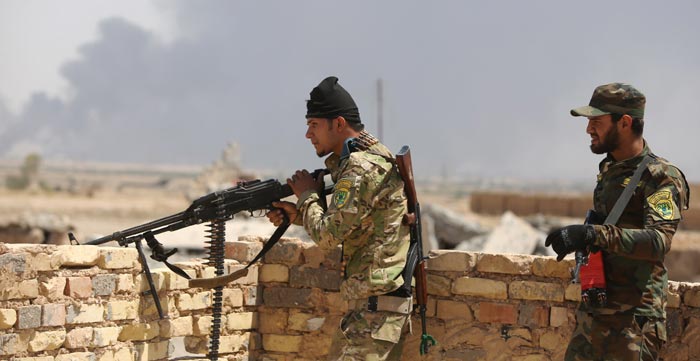Iraqi fighters from the Shia popular mobilisation unit hold position on the outskirts of Baiji refinery north of Tikrit, during a joint operation with the Iraqi army to retake the remaining area of the oil refinery from Islamic State jihadists, on Monday.
* Islamic State reinforces Ramadi
* Pro-government forces prepare to retake the city
* Syrian air force attacks Islamists in Palmyra
Reuters/Baghdad/Beirut
Islamic State poured more fighters into Ramadi as security forces and Shia paramilitaries prepared to retake the Iraqi city that fell to the Islamists a week ago in a major setback for the government.
In Palmyra, the Syrian air force struck at buildings captured by the militant group, whose arrival has raised fears that the city's famed Roman ruins will be destroyed.
The air force levelled Islamic State "hideouts" and killed a large number of its members around Palmyra's military air base, Syrian state media said.
Islamic State has killed at least 217 people execution-style, including children, since it moved into the Palmyra area 10 days ago, according to the British-based Syrian Observatory for Human Rights. Another 300 soldiers were killed before the Syrian city was captured, the monitoring group said.
Counter-offensive
The insurgents reinforced Ramadi on Monday, deploying fighters in preparation for battle against security forces and paramilitary groups advancing on the provincial capital, which lies 110 km northwest of the capital, Baghdad.
Iraqi forces have regained ground east of Ramadi since launching a counter-offensive on Saturday, a week after it was overrun, and on Monday retook a rural area south of the city.
Police sources said Iraqi forces supported by Iran-backed Shia militia and locally recruited tribal fighters had retaken parts of al-Tash, 20 km south of Ramadi.
Pro-government tribal fighters, with the help of the army, laid land mines to reinforce their defensive lines around Baghdadi, a settlement northwest of Ramadi which controls access to a major Iraqi air base. Islamic State attacked Baghdadi with seven suicide car bombs on Sunday.
In Ramadi, residents said trucks carrying Islamic State fighters arrived on Sunday evening.
Local man Abu Saed heard a commotion outside his house in the city's southeastern Officers neighbourhood. "I saw two trucks pull up outside with dozens of fighters carrying arms running quickly into nearby buildings and taking cover."
Another resident said at least 40 fighters had jumped out of three trucks that arrived in the southern al-Tamim district on Sunday evening.
"They were carrying weapons and wearing mostly khaki dress with ammunition belts wrapped around their chests," said Abu Mutaz. "They were talking in an Arabic dialect, they were not Iraqis."
Major setback
The seizures of Ramadi and Palmyra were Islamic State's biggest successes since a US-led coalition launched an air war against it last year.
The near simultaneous victories against the Iraqi and Syrian armies have forced Washington to examine its strategy of bombing from the air while leaving fighting on the ground to local forces.
In a sharp criticism of Washington's ally, US Defence Secretary Ashton Carter on Sunday accused the Iraqi army of abandoning Ramadi to a much smaller enemy force.
A spokesman for Iraqi Prime Minister Haidar al-Abadi dismissed the comments as "untimely and surprising at a time when Iraqi security forces are preparing to launch a counter offensive to retake Ramadi".
Meanwhile, the US and its allies carried out 10 air strikes against Islamic State militants in Syria and 25 strikes in Iraq since Sunday, the US military said.
Most of the strikes in Syria were in the northeast, near Al Hasakah, while in Iraq, Islamic State positions were attacked near Baghdadi, Bayji, Fallujah and Mosul, among other sites.

